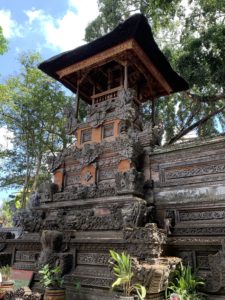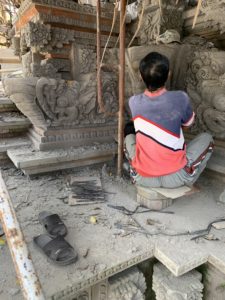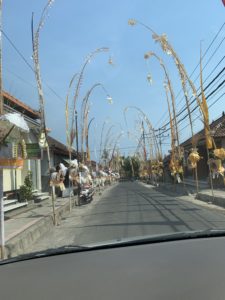
In Bali, there are temples everywhere. Most families live in compounds with every element located in the ideal place. And every compound has a temple. The temple or family shrine is always placed at the northeast corner of the compound. These shrines are made out of soft stones that are intricately carved to honor ancestors and Gods. When a Balinese man gets married, he builds a shrine for that. These carvings are expensive to have done, so many families construct the temples and shrines with flat stones and have them cared as they can afford to. What fascinates me is that these carvings only last three to six years as they disintegrate in the elements. This makes the maintaining of all these shrines and temples on Bali an ongoing process. And all the carving is done by hand, no power tools!

The Balinese also pray every day and make offerings to the Gods. Small decorative baskets are woven from coconut palm fronds and inside are placed four different kinds of flowers representing the colors of the four directions. And food is always included as well as lit incense. You see these everywhere in Bali, thousands of them fresh every day. They are beautiful, then they get tossed in the trash.

The calendar is different in Bali. A new year starts every 210 days. Along with this calendar, there are many celebrations in the Bali year along with blessings and celebrations for weddings and for lots of other things. Whole communities participate in the celebrations and streets are always lined with festive Penjor. These are tall, up to 31 feet, decorated bamboo poles that bend gracefully over the roads they line. The decorations are all created by hand, and at the end of the celebrations, they are taken down and burned.

All these beautiful things have short lives, but the communities continue to create them to constantly celebrate, honor, and be surrounded by beauty.
We traveled to the water temple at Tirtha Empul on our last day together. Erected over a natural spring, the temple was created as a place of cleansing. Our wonderful guide was a friend of Gaya Ceramics who owns a vegan restaurant and sustainable garden near Gaya. He explained that we all take showers or baths to wash away what we can see on the outside, but the Balinese believe it is also important to wash away what doesn’t show symbolically. This allows us to release what we no longer need and make space for what we aspire to. To do this, we enter the springs fully clothed including a sarong. Then we walk up to the spout of crystal- clear flowing water to cleanse however we want to. The source of the water for all the spouts and all the people is the same, as is the source of everything.

Experiencing this beautiful ritual was refreshing and restoring. I used the opportunity to focus on what is the most important to me. This was a fitting end of this Bali journey which demonstrated the impermanence and fragility of the material aspects of life as well that the strength and importance of love which lasts forever.
I am grateful I said yes to this journey.


Life is fleeting. It is so important to stop, notice, appreciate and be grateful NOW. So glad you are on this trip to Bali. Thanks for sharing.